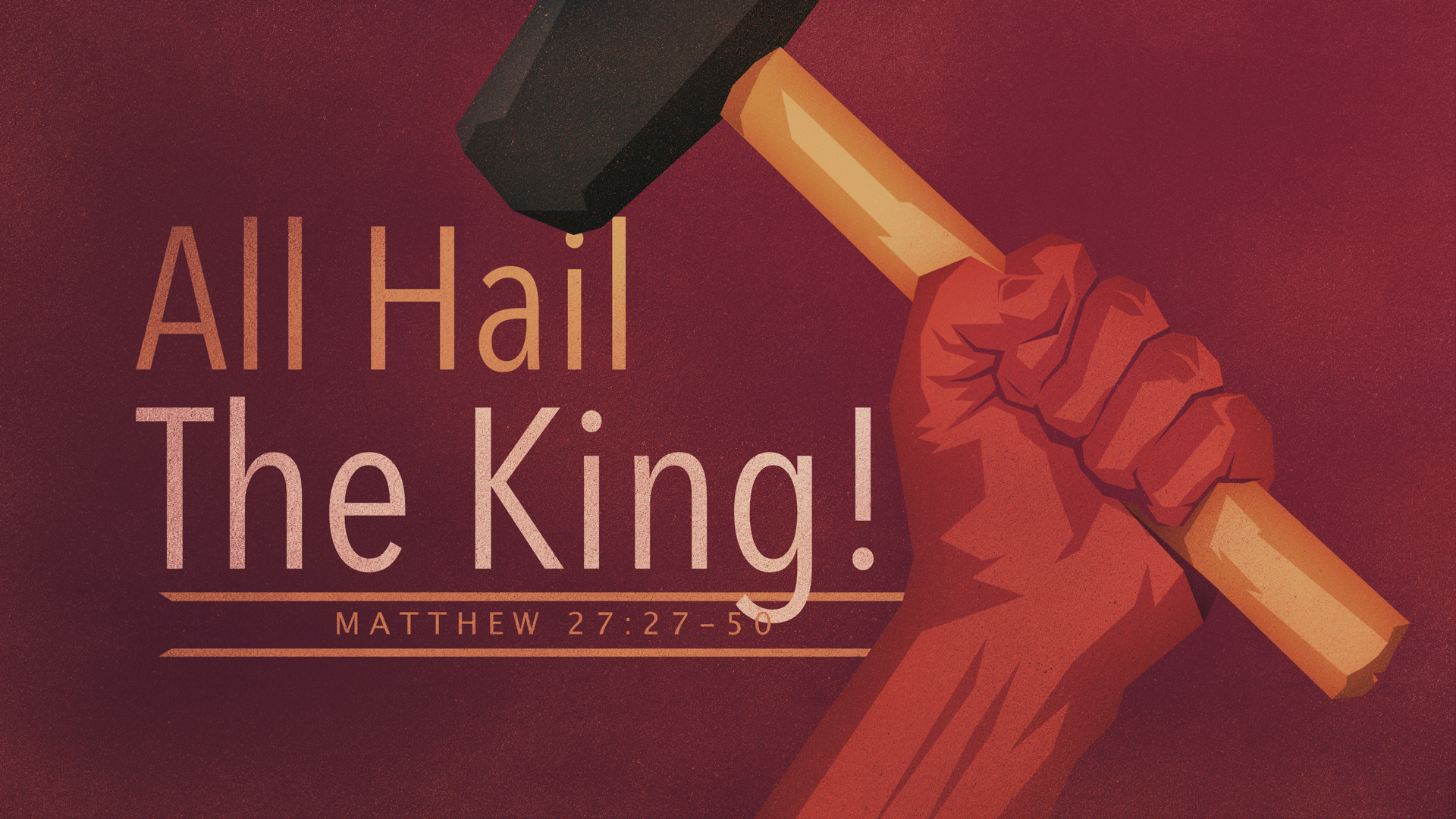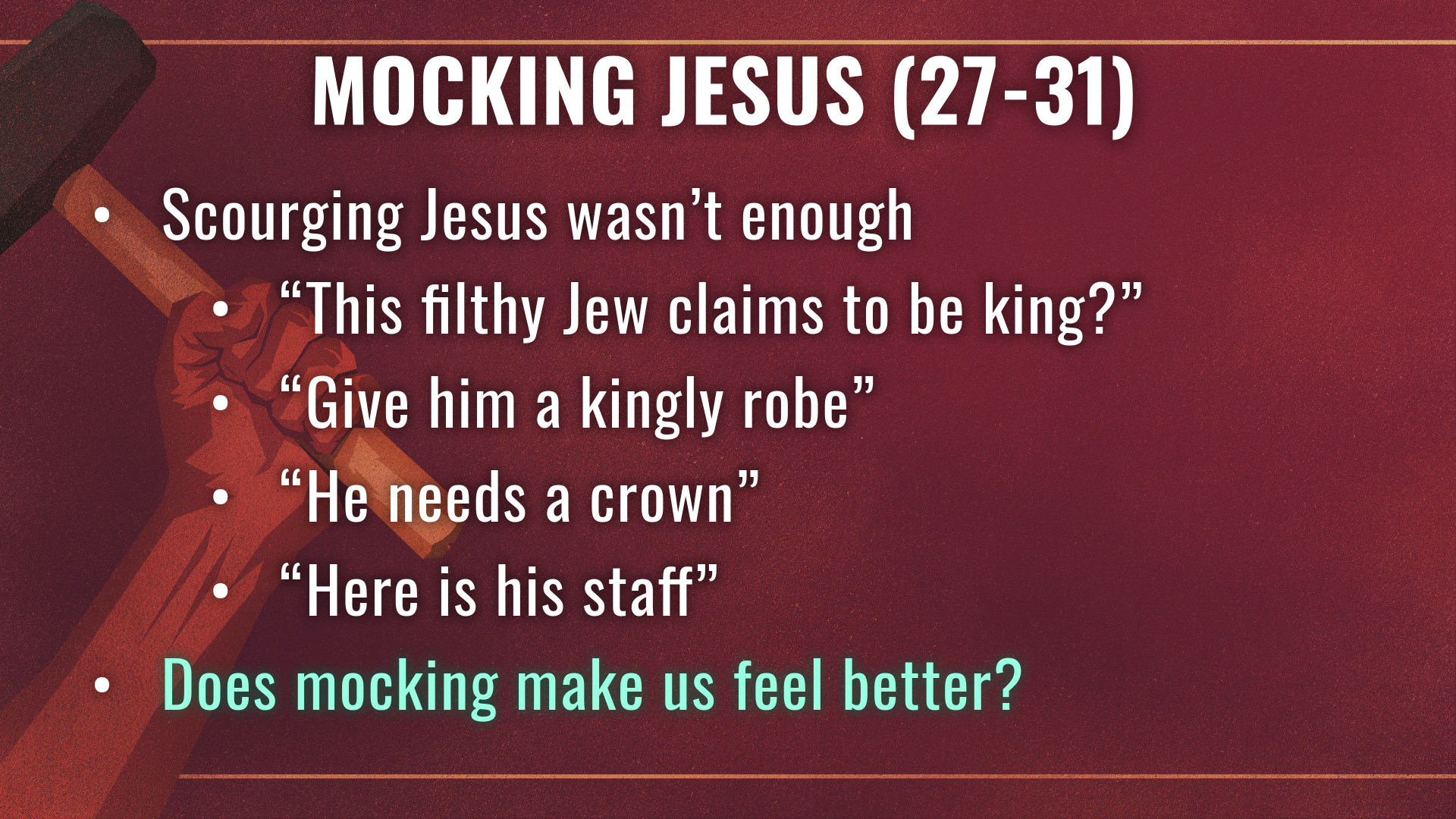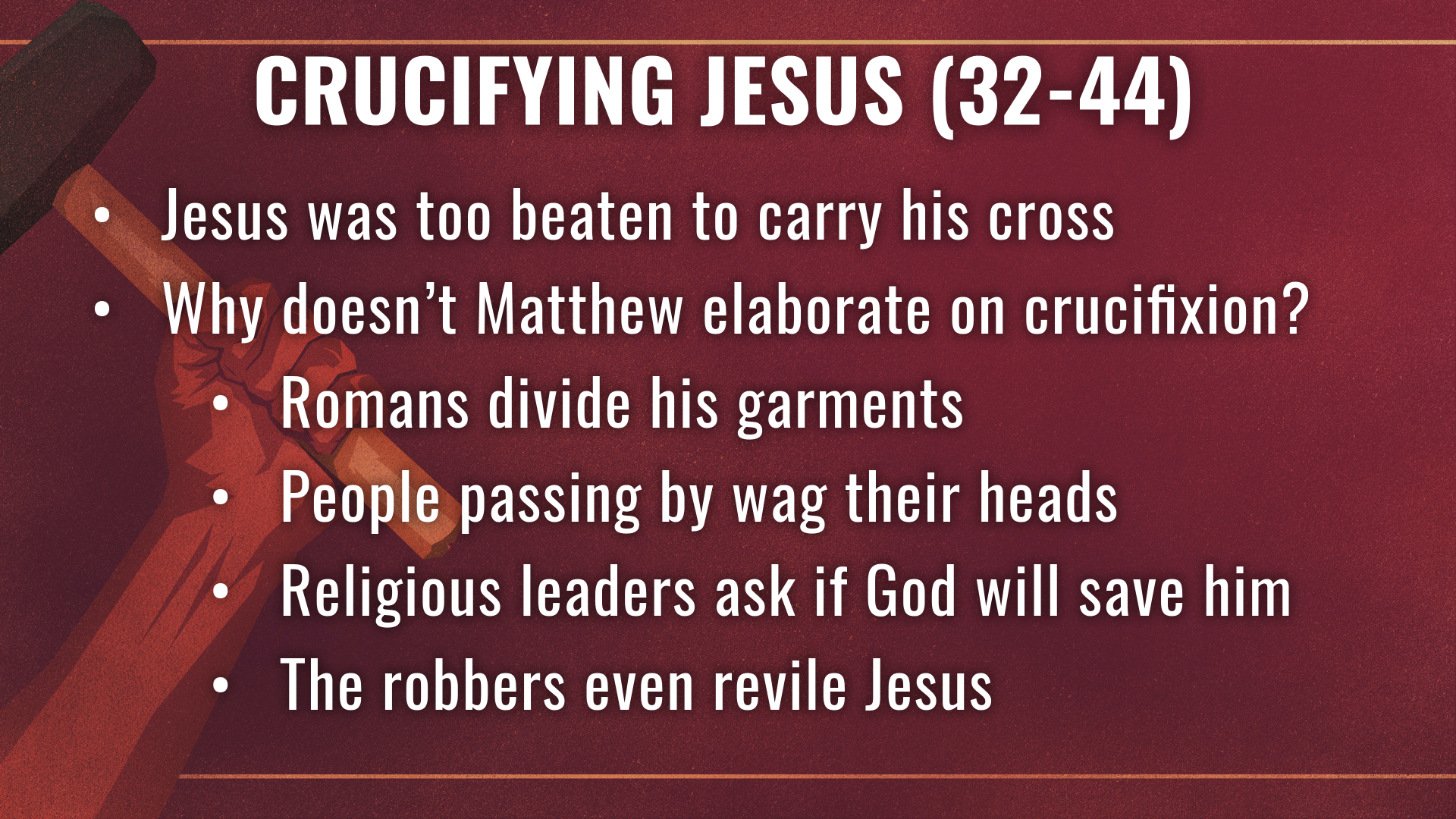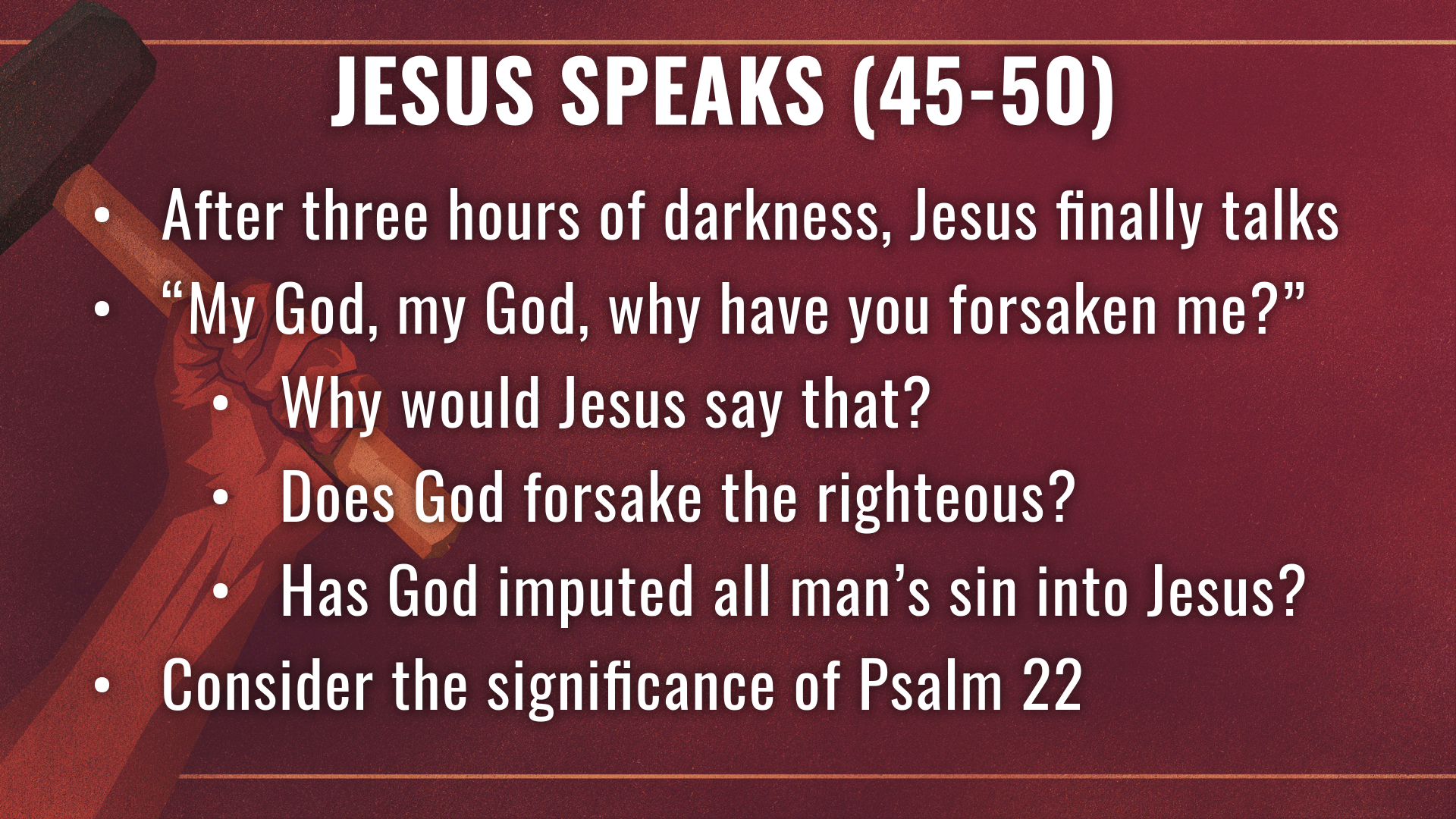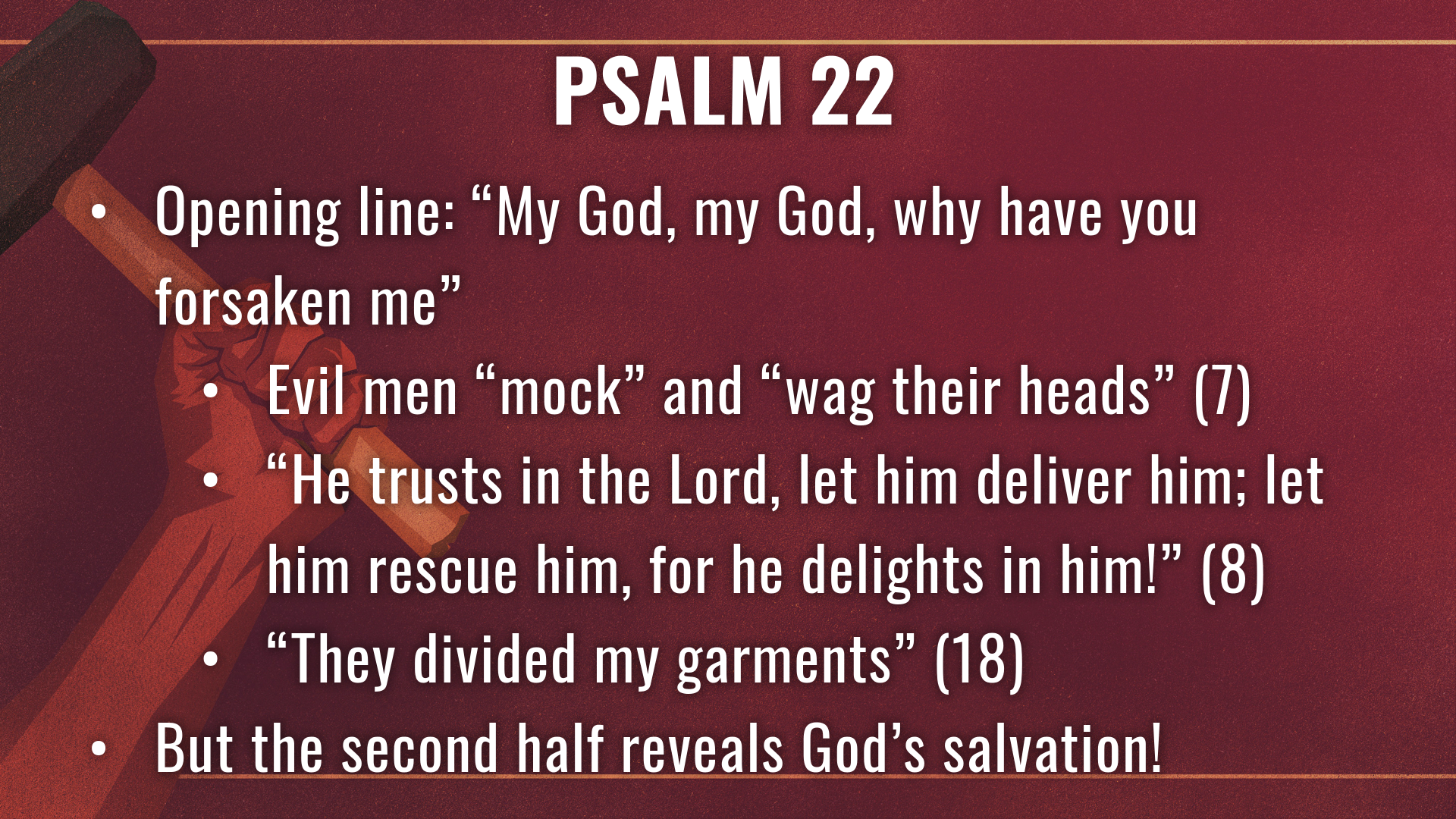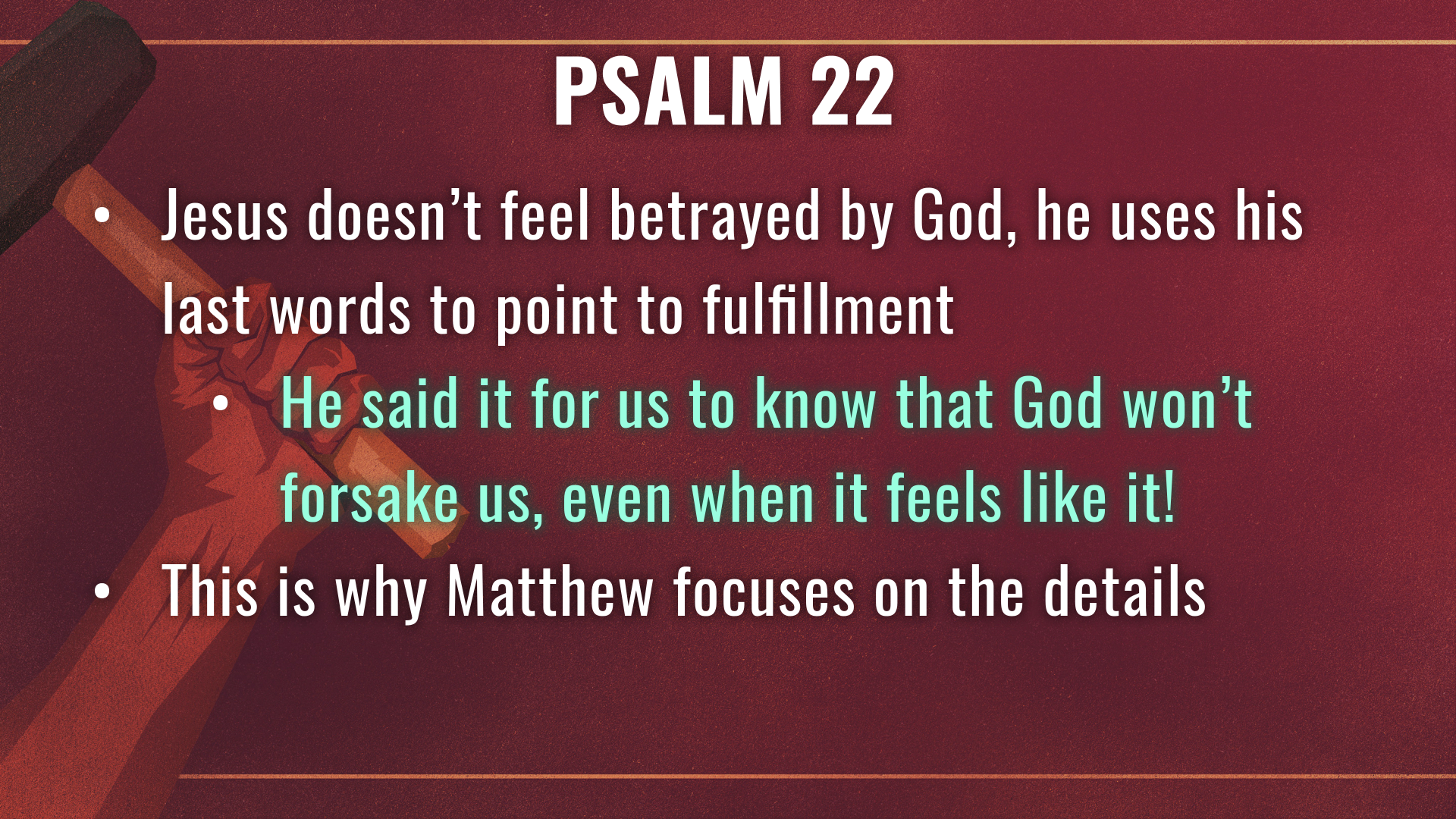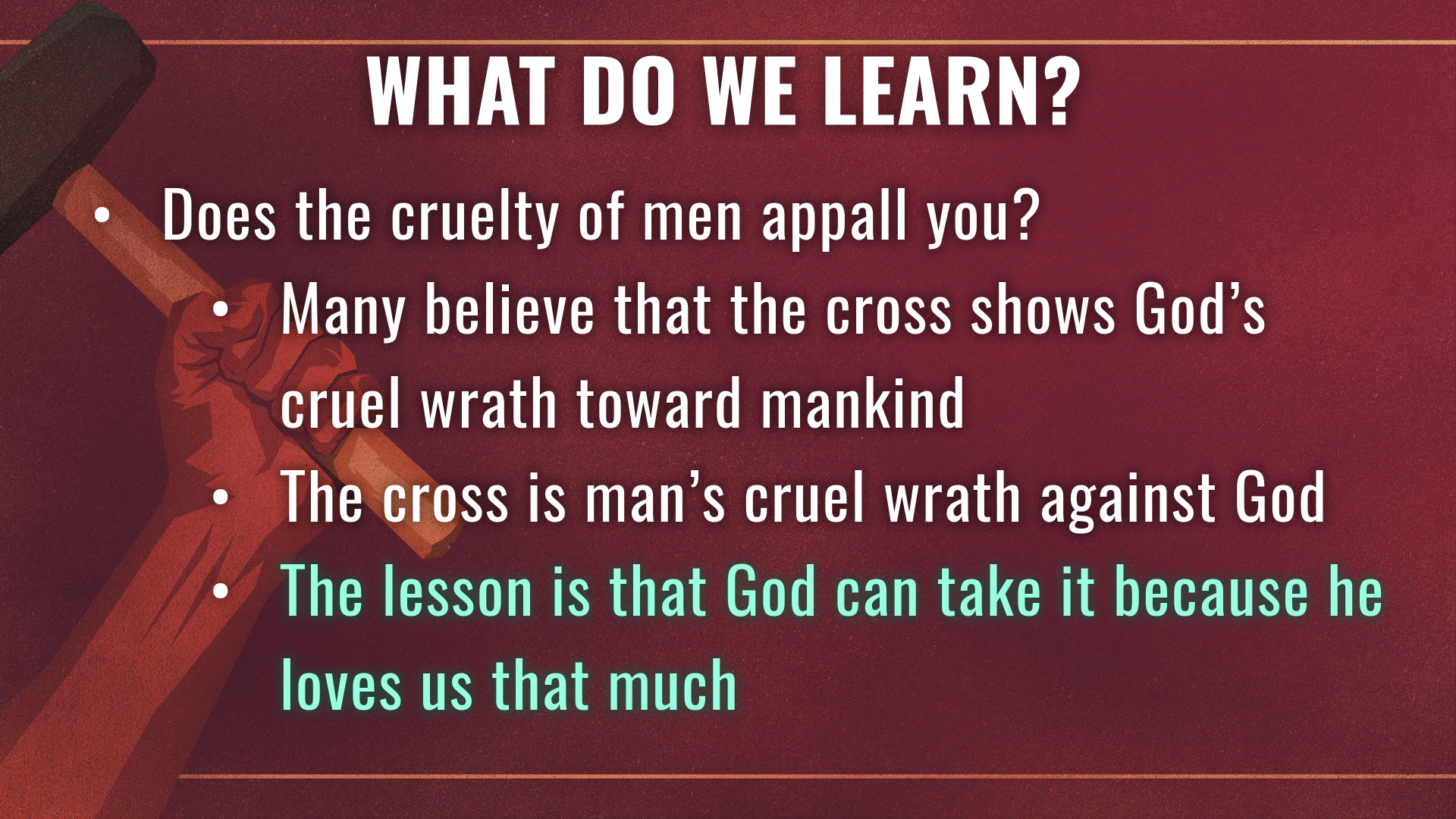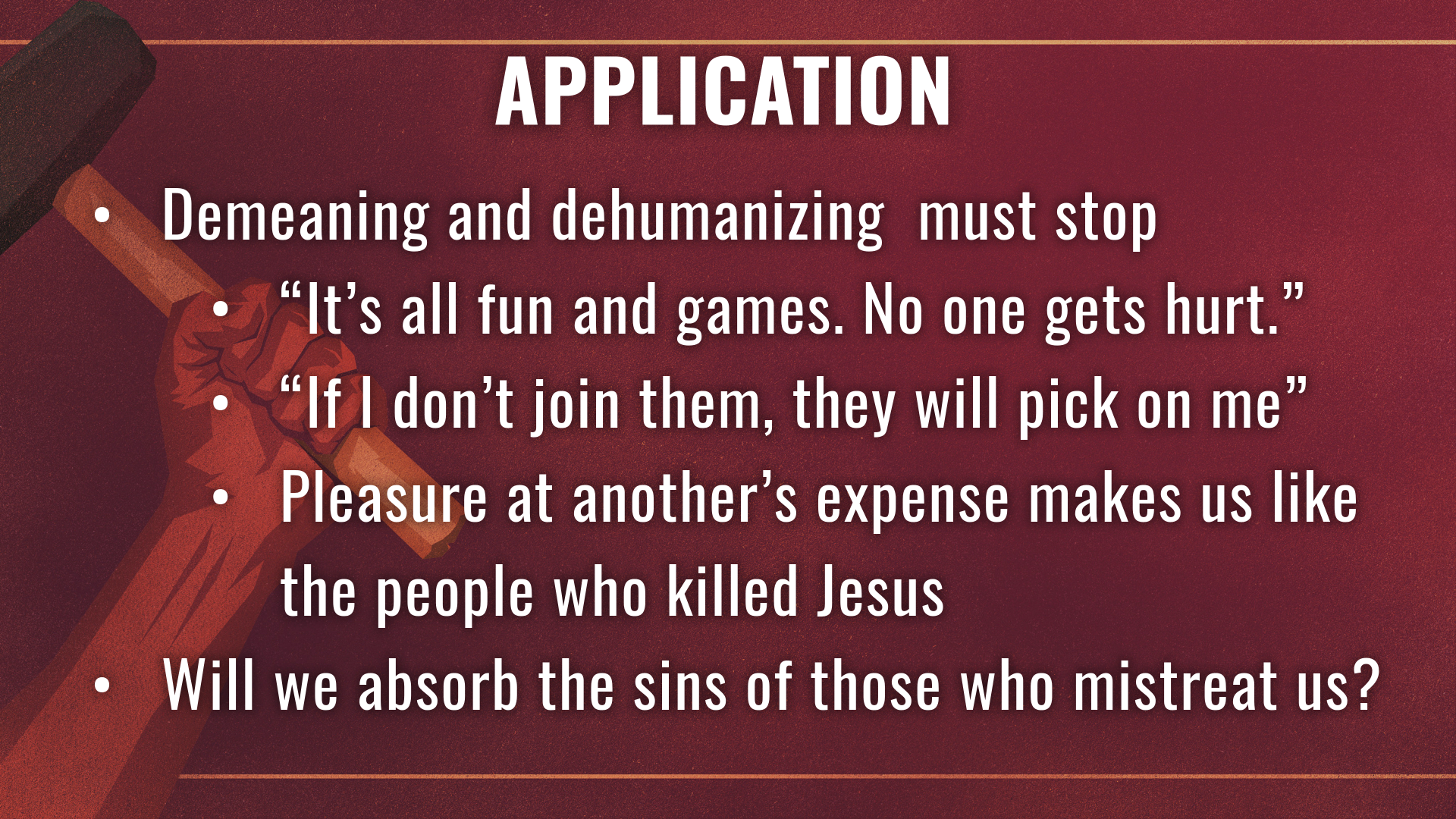All Hail The King! (Matthew 27:27-50)
Words hurt. Don’t they? What is it about being mean to people that appeals to us? Growing up, I didn’t like to be mean to people. But I would sometimes struggle with a desire to retaliate. When someone is doing something mean toward me, something inside of me wants to turn around and do something way worse back toward them. The more I think about it, the more advanced and creative my retaliation becomes. I know that what drives me toward that is anger and a desire for “justice.” But I don’t want justice. I want pain and suffering. But, of course, I have learned to be gracious and merciful. I know that causing them pain only brings me more pain and destroys our relationship.
This week, I went to my old turf. I saw my childhood home, elementary school, and the church building I went to as a child. The memories came flooding in, but one memory stood out to me. I remember going into the auditorium before school and hearing my best friend at the time making fun of me behind my back. Looking back, I’m sure he was being mean to make the guys laugh, but I exploded on him. I also remember being mean to another person.
How many of us have gone through similar situations? Do you remember being mean to someone else? But I get tempted to be mean to people often. Our text today is about people being mean to our Lord. We will think about why people are mean and why we sometimes want to be mean. Then, we are going to talk about our struggle with retaliation.
Mocking Jesus
Matthew 27:27--31 (ESV) --- 27 Then the soldiers of the governor took Jesus into the governor’s headquarters, and they gathered the whole battalion before him. 28 And they stripped him and put a scarlet robe on him, 29 and twisting together a crown of thorns, they put it on his head and put a reed in his right hand. And kneeling before him, they mocked him, saying, “Hail, King of the Jews!” 30 And they spit on him and took the reed and struck him on the head. 31 And when they had mocked him, they stripped him of the robe and put his own clothes on him and led him away to crucify him.
After Jesus had been scourged (v.26), a beating with a whip full of glass shards essentially cutting off the skin, they mock him. Hundreds of soldiers are gathered around Jesus to take turns mocking him. “Who does he think he is? Can you believe a filthy Jew would claim to be king? Let’s teach these Jews a lesson!” So they grab an old robe that they would wear under their armor. It’s faded to the point of looking purple, the color of a king. They strip him down in front of everyone and put this robe on him. If this man is going to be a king, he would need a kingly garland on the top of his head. That’s what Caesar wears. But instead of using green vines with beautiful flowers, they give him a crown of thorns. Finally, they give him a reed, which would be a flimsy plant. That represents the king’s staff. Can you imagine this horrible representation of a king?
This is the way men saw him. They didn’t see him as powerful or threatening. They saw him as a sad little man. They used him as an opportunity to gain friends and feel important. Does it make us feel better about ourselves or make us feel safe when we are mean to people? Are we trying to impress other people and find acceptance? Afterward, they bowed down to him as though he was their king. They said, “Hail, king of the Jews! Then, they spit on him and beat him with the reed they gave him on the head where the crown of thorns was.
What if we all took turns picking on you for who you are? Can you imagine how that would feel? How would that feel? How would you respond? Would you be able to stay silent? Who in their right mind would submit to this willingly?
Crucifying Jesus (32-44)
As bad as this mockery is, it only gets worse when we move forward in the story. Other gospels tell us that Jesus was presented before the crowd, and Pilate said, “Behold your King!” From there, they went out to the place where Jesus would be crucified.
Matthew 27:32--44 (ESV) --- 32 As they went out, they found a man of Cyrene, Simon by name. They compelled this man to carry his cross. 33 And when they came to a place called Golgotha (which means Place of a Skull), 34 they offered him wine to drink, mixed with gall, but when he tasted it, he would not drink it. 35 And when they had crucified him, they divided his garments among them by casting lots. 36 Then they sat down and kept watch over him there. 37 And over his head they put the charge against him, which read, “This is Jesus, the King of the Jews.” 38 Then two robbers were crucified with him, one on the right and one on the left. 39 And those who passed by derided him, wagging their heads 40 and saying, “You who would destroy the temple and rebuild it in three days, save yourself! If you are the Son of God, come down from the cross.” 41 So also the chief priests, with the scribes and elders, mocked him, saying, 42 “He saved others; he cannot save himself. He is the King of Israel; let him come down now from the cross, and we will believe in him. 43 He trusts in God; let God deliver him now, if he desires him. For he said, ‘I am the Son of God.’ ” 44 And the robbers who were crucified with him also reviled him in the same way.
This is the section where Jesus is crucified. He tries to carry the wood he would be nailed to, but his beating is so bad that he can’t carry it by himself. So they forced another man to help him. Then, they came up to Golgotha and tried to give him wine mixed with gall. That would desensitize Jesus to the pain and suffering he was about to go through. They gave the prisoners that because they wanted them to stay still while they nailed them to the cross.
Verse 35 quickly summarizes the process of nailing him to the cross by saying that they crucified him. Notice that Matthew doesn’t elaborate. That’s not the point. Everyone knows what crucifixion is. Instead of dwelling on that, he discusses how the people continued to be cruel to Jesus.
The Romans were cruel. They divided up his garments, sat down and kept watch over them, and put a sign over his head saying “King of the Jews” (probably trying to get to the religious leaders more than anything).
Also, we learn that this location would have had people passing by. It was beside the main road leading to Jerusalem. Can you imagine how many people would be making their way into the city of Jerusalem on the day of Passover? Tens of thousands of people were passing by and seeing Jesus. Those who passed him were making fun of him. They were wagging their heads at him. There was a lot of taunting going on because they thought Jesus was a fool. How could he rebuild the temple if he couldn’t get down from the cross?
The religious leaders joined in on the fun. They mockingly say, “He saved others, he cannot save himself.” This is fascinating because they knew that he had saved others from death, but they felt no allegiance to him. They claim that if Jesus comes down from the cross, they will believe in him. They use this as a test to see if God really loves him.
Then, we see the robbers reviled him in the same way. These are men who were guilty of sin. They were bandits being punished for evil, but Jesus had done nothing.
Jesus Speaks (45-50)
Matthew 27:45--50 (ESV) --- 45 Now from the sixth hour there was darkness over all the land until the ninth hour. 46 And about the ninth hour Jesus cried out with a loud voice, saying, “Eli, Eli, lema sabachthani?” that is, “My God, my God, why have you forsaken me?” 47 And some of the bystanders, hearing it, said, “This man is calling Elijah.” 48 And one of them at once ran and took a sponge, filled it with sour wine, and put it on a reed and gave it to him to drink. 49 But the others said, “Wait, let us see whether Elijah will come to save him.” 50 And Jesus cried out again with a loud voice and yielded up his spirit.
About halfway through the crucifixion of Jesus, all of the land is covered in darkness. For three hours, God covered the land in darkness. Then, Jesus speaks out. What does he say? He says, “My God, my God, why have you forsaken me?” But he says it in Aramaic, and many don’t understand him. Many believe that he calls for Elijah to come and take him up into heaven. Elijah was taken up into heaven in a whirlwind, and they thought he might get Jesus. They don’t know that Elijah was John the Baptist.
But Jesus said, “My God, my God, why have you forsaken me?” Why would Jesus say that? Does Jesus believe that he has been forsaken? Has Jesus been forsaken? Some people say, “Yes.” They believe the darkness indicates that God has “turned his back on” Jesus. Somehow, Jesus became sin (not a sin offering), and God couldn’t be with him.
Really?
Consider that the words of Jesus are a direct quote from the beginning of Psalm 22. Is that coincidental? No. When we turn back to Psalm 22, we see several references to the suffering that Jesus would go through. Matthew wanted us to go to Psalm 22 and see that Jesus is the fulfillment of Psalm 22. David is writing in this Psalm and claiming that he is despised and rejected by men. He is surrounded by evil men who “mock” and “wag their heads” (7). He claims that they are saying, “He trusts in the Lord; let him deliver him; let him rescue him, for he delights in him!” (8) Verse 18 says, “They divide my garments among them, and for my clothing they cast lots.” Jesus says these words to refer all those in attendance to the fulfillment of Psalm 22. While suffering, he is trying to help people. He’s not losing faith in the goodness of God!
The second half of Psalm 22 points out that God delivers, and the result is David’s praise. Verse 27 also says, “All the ends of the earth shall remember and turn to the Lord, and all the families of the nations shall worship before you.” Jesus knows what he is doing. He knows the outcome. He doesn’t feel betrayed, and he wants them to understand the truth.
Think about the difficulty of believing that God has put all of man’s sin into Jesus and punished him for them. Wouldn’t that compromise his goodness? Even thinking that God has abandoned his son when he needs him most does not align with God’s character. So, if we believe that, we might want to take a deeper look at the texts like Gal 3, Isaiah 53, and 2 Cor 5:21.
What Do We Learn?
Does the cruelty of these men appall you? This makes me sick. Many believe that the cross is where we go to understand God’s wrath against man, but it’s not. The wrath of the cross was man’s wrath against God, and the picture is that God can take it. We don’t want to take the sin of man against us, and God doesn’t want to take it, but he does because he loves us. Jesus took all of the sins that man committed against him, and he absorbed them without punishing them for their evil.
Application
Stop Being Evil
If you are involved in any demeaning or dehumanizing evil, your sin resembles these men and women. If you crack jokes at people’s expense or laugh along with those who do, your sin resembles theirs. If you look at pornography and support that, you are joining the side of those who are evil. If you look down on people and bully them for their beliefs, whose side are you on?
You don’t want to believe that you have been like them if you are like me, but we know we have. We all have joined that side. The question is, “Why would we do that?” Isn’t it because we want approval, support, and protection. We don’t want to be the butt of the joke. We want to join the side of those who seem to have power and avoid their wrath on us.
Absorb Their Sin
Consider how hard it is for you to absorb the sins of those who mistreat you. How much evil can you take before you have to set the record straight and retaliate? Aren’t you glad that Jesus doesn’t feel that way when you sin against him or those he loves?
Isn’t it amazing that Jesus takes it? He doesn’t call ten thousand angels to destroy those enemies who treat him this way. Eventually, many of those who mocked him received his grace and were forgiven entirely. The same is true for us. He doesn’t destroy us when we treat people this way. He is patient. Right now, we have time to repent and be forgiven of our sins. But a day is coming when that mercy will no longer be available.
Conclusion
Those who have died in disbelief will experience the wrath of God. We all deserve it, but those who submit to God now don’t have to experience it. Jesus became a sin offering for us to be forgiven. He wants to save and forgive. That’s why he pointed people to the fact that he is the Messiah with his last breath on the cross. The question is not whether or not he will forgive you. The question is, “Will we believe and submit right now?”

